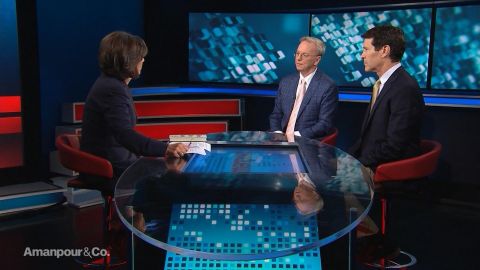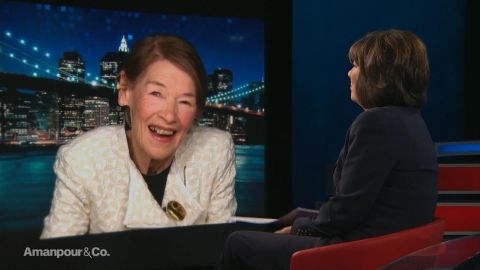Read Transcript EXPAND
CHRISTIANE AMANPOUR: So, what do you think about the state of your big companies right now? Is there room? Is it time to make some dramatic changes in solutions? First, since you were CEO.
ERIC SCHMIDT, FORMER GOOGLE CEO AND CO-AUTHOR, “TRILLION DOLLAR COACH”: Well, I always worry about regulation, which is around the current problem, and not fixing the real problem. I think it’s much better when the tech giants, as you call them, work on solving this themselves. Each company is different. In Google’s case, we worked really, really hard to find and detect evil things that violate our policies and take them down super quickly. There’s furthermore promise that A.I. will allow this to be detected automatically.
AMANPOUR: What about you? I mean, they — you are giants. I mean, you’ve dominated the landscape ever since sort of, you know, this started. What do you think? Because everybody says, yes, you know, these companies should regulate themselves. We don’t want government, et cetera. But the U.S. is playing catch up to Europe where there is regulation and to a growing clamor amongst people for some kind of more responsible attitude toward what’s out there.
ALAN EAGLE, DIRECTOR OF GOOGLE AND CO-AUTHOR, “TRILLION DOLLAR COACH”: I can just tell you from what’s going on day-to-day inside the company, as a director on the sales team, people are working very hard every day to do the right thing. As Eric was talking about, you know, in an open web, it’s going to be a constant battle of people putting up bad things and we try to find them and bring them down as quickly as possible. But the company really is trying very hard working very hard on these every day.
AMANPOUR: So, I’m going to play a soundbite from Senator Kamala Harris, one of the presidential candidates. And she along with Senator Elizabeth Warren are very clear about what they say they want to do, and that is sort of a breakup of the giant companies. This is what she said recently.
(BEGIN VIDEO CLIP)
SEN. KAMALA HARRIS, PRESIDENTIAL CANDIDATE: We have to recognize it for what it is, it is essentially a utility that has gone unregulated. And as far as I’m concerned, that’s got to stop.
(END VIDEO CLIP)
AMANPOUR: I mean, she is talking sense, right? It’s gone unregulated, and to a great degree, I mean, Google, Facebook, all the others, have not done enough, according to her and according to many people, to regulate themselves.
SCHMIDT: She’s also running for president.
AMANPOUR: Correct.
SCHMIDT: As is her competitor, Elizabeth Warren. There’s no basis in law to break up these companies in the U.S. And fundamentally, the breakup would increase costs. It’s far, far better for the companies to try to figure out how to solve this problem. The people inside these companies don’t want this stuff to happen either. The fact of the matter is that a very small percentage of humans do really bad things. We need to get better at detecting these things and stopping it.
AMANPOUR: What would you then say when you say there’s no basis in law or we the companies should do it ourselves and not have government — what then is a solution?
SCHMIDT: Well, as I said, the computer industry as a whole, and each of the companies, YouTube does a fantastic job of this, detect bad stuff automatically using various mathematical techniques in history and so forth.
About This Episode EXPAND
Christiane Amanpour speaks with Eric Schmidt and Alan Eagle about privacy, democracy and the spread of extremism on the internet. She also speaks with actor Glenda Jackson about her role in “King Lear” on Broadway. Alicia Menendez speaks with filmmaker Phillip Youmans about “Burning Cane,” the 19-year-old’s first film that won three awards at this year’s Tribeca Film Festival.
LEARN MORE


